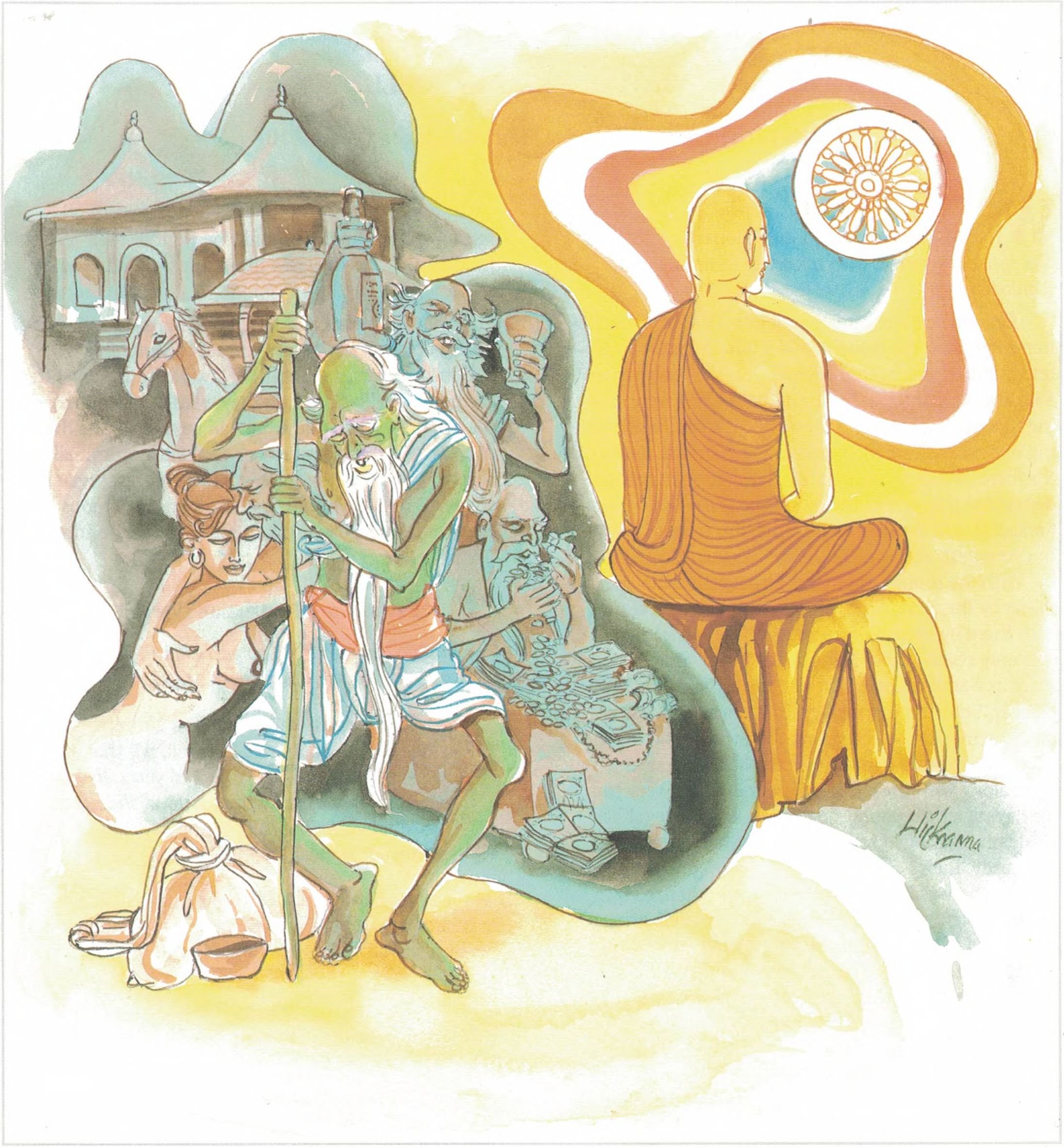Dhammapada (Illustrated)
by Ven. Weagoda Sarada Maha Thero | 1993 | 341,201 words | ISBN-10: 9810049382 | ISBN-13: 9789810049386
This page describes The Story of Khanu-Kondanna which is verse 111 of the English translation of the Dhammapada which forms a part of the Sutta Pitaka of the Buddhist canon of literature. Presenting the fundamental basics of the Buddhist way of life, the Dhammapada is a collection of 423 stanzas. This verse 111 is part of the Sahassa Vagga (Thousands) and the moral of the story is “A day’s life of a wise meditator is greater than a hundred years of an immoral fool”.
Verse 111 - The Story of Khānu-Koṇḍañña
Pali text, illustration and English translation of Dhammapada verse 111:
yo ca vassasataṃ jīve duppañño asamāhito |
ekāhaṃ jīvitaṃ seyyo paññavantassa jhāyino || 111 ||
111. Though one should live a hundred years foolish, uncontrolled, yet better is life for a single day wise and meditative.
 A day’s life of a wise meditator is greater than a hundred years of an immoral fool. |
The Story of Khānu-Koṇḍañña
While residing at the Jetavana Monastery, the Buddha spoke this verse, with reference to Khānu Koṇḍañña.
This Venerable, it appears, obtained a meditation topic from the Buddha, and while residing in the forest attained arahatship. Desiring to inform the Buddha of his attainment, he set out to return from the forest. Growing tired by the way, he left the road, seated himself on a flat stone, and entered into a state of trance. Now at that time a band of five hundred thieves plundered a village, packed up their spoils in sacks of sizes proportioned to the strength of their several members, placed the sacks on their heads, and carried them for a long distance. Becoming weary, they said to themselves, “We have come a long distance; let us rest on the top of this flat rock.” So saying, they left the road, went to the rock, and mistook the Venerable for the stump of a tree. One of the thieves placed his sack on the Venerable’s head, and another placed his sack near his body. One after another, the five hundred thieves set their sacks in a circle about him and then lay down and went to sleep.
At dawn they woke up and took their sacks. Seeing the Venerable, and thinking he was an evil spirit, they started to run away. The Venerable said to them, “Lay disciples, have no fear; I am a monk.” Thereupon they prostrated themselves before his feet and begged his pardon, saying, “Pardon us, Venerable; we mistook you for the stump of a tree.” The ringleader of the thieves said, I intend to become a monk under the Venerable.” The rest said, “We also will become monks.” And with one accord all the thieves requested the Venerable to make them monks. The Venerable made monks of them all, just as did the novice Saṃkicca. From that time forward he went by the name of Stump Koṇḍañña, Khānu-Koṇḍañña.
Accompanied by those monks, he went to the Buddha. When the Buddha asked him, “Koṇḍañña, you have obtained pupils?” he told him what had happened. The Buddha asked, “Monks, is this true?” “Yes, Venerable; we never saw such an exhibition of magical power before and therefore we have become monks.” The Buddha replied, “Monks, it were better for you to live but a single day in the exercise of the wisdom you have just acquired than to live for a hundred years committing such acts of foolishness.”
Explanatory Translation (Verse 111)
duppañño asamāhito yo ca vassasataṃ jīve
paññavantassa jhāino ekāhaṃ jīvitaṃ seyyo
duppañño [duppañña]: unwise; asamāhito unsteady and fluctuating in mind; yo: some person; ca: even if, vassasataṃ jīve: were to live hundred years; paññavantassa: of a person endowed with wisdom; jhāino [jhāina]: mentally disciplined; ekāhaṃ [ekāha]: only one day’s; jīvitaṃ [jīvita]: life; seyyo [seyya]: is greater
A single day’s life of a wise person, who is aware of reality, is greater than even hundred years of life of an individual who is bereft of wisdom and insight.
Commentary and exegetical material (Verse ______)
jhāino: one who practises jhāna. The Buddha describes jhāna this way:
(1) Withdrawn from sensual objects, withdrawn from unwholesome states of mind, the monk enters into the first jhāna, which is accompanied by inference (vitakka) and inquiry (vicāra), filled with joy (pīti) and comfort (sukha) which is born of detachment.
(2) After the subsidence of inference and inquiry, and by gaining inner tranquillity and oneness of mind, he enters into the second jhāna, which is born of stillness of mind, and filled with joy (pīti) and comfort (sukha).
(3) After the fading away of joy he dwells in equanimity, mindful, clearly conscious; and he experiences in his person that feeling of which the Noble Ones say, ‘Happy lives the man of equanimity and attentive mind’; thus he enters the Third absorption.
(4) After having given up pleasure and pain, and through the disappearance of previous joy and grief, he enters into a state beyond pleasure and pain, into the Fourth absorption, which is purified by Equanimity (upekkhā) and mindfulness.
(5) Through the total overcoming of the perceptions of matter, however, and through the vanishing of sense-reactions and the nonattention to the perceptions of variety, with the idea, ‘boundless is space’, he reaches the sphere of boundless space (ākāsānañcāyatana) and abides therein.
